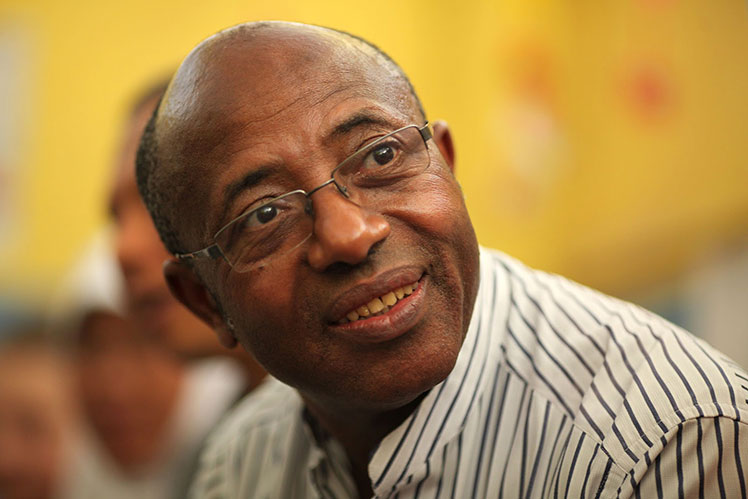Iodine Global Network (IGN)
Sprunglinks/Accesskeys
Zur Startseite (Accesskey 0) Direkt zur Hauptnavigation (Accesskey 1) Direkt zum Inhalt (Accesskey 2) Kontakt (Accesskey 3) Sitemap (Accesskey 4) Suche (Accesskey 5)
DONATE

Meet your IGN Regional Coordinator Dr. Festo Kavishe
March 2020

Dr. Festo Kavishe, Regional Coordinator for Eastern & Southern Africa
How long have you been with IGN, and what is your role?
I have been with IGN for three years, since 2017, as Regional Coordinator for Eastern and Southern Africa.What has been the biggest success of your career and the biggest challenge?
My career spans 42 years, of which three years have been with IGN, 20 years with UNICEF, 15 years with the Government of Tanzania and the rest as an independent human development consultant specializing in the development of national multisectoral nutrition action plans focused on children and women. I joined the fight against IDD in 1979 in Tanzania and continued to do so in my career with UNICEF in the Eastern and Southern Africa and East Asia and Pacific regions.
I consider my biggest achievement in IDD to be the effective facilitation and promotion of the development of national IDD and Universal Salt Iodization (USI) programs in the Eastern and Southern Africa Region. My recent biggest success is as Lead Facilitator in an an interagency USI-IDD Consultation held in Mombasa Kenya in November 2019, hosted by the Ministry of Health, Kenya and jointly supported by IGN, UNICEF, WHO, NI and GAIN. The Consultation was attended by 75 participants from 15 countries and it developed Country Action Plans to sustain USI and eliminate IDD in the region by 2025.
My biggest challenge in the area of IDD has been to find a sustainable way to maintain high public awareness and keeping sustainable USI and elimination of IDD high on the development agenda of countries.
I consider my biggest achievement in IDD to be the effective facilitation and promotion of the development of national IDD and Universal Salt Iodization (USI) programs in the Eastern and Southern Africa Region. My recent biggest success is as Lead Facilitator in an an interagency USI-IDD Consultation held in Mombasa Kenya in November 2019, hosted by the Ministry of Health, Kenya and jointly supported by IGN, UNICEF, WHO, NI and GAIN. The Consultation was attended by 75 participants from 15 countries and it developed Country Action Plans to sustain USI and eliminate IDD in the region by 2025.
My biggest challenge in the area of IDD has been to find a sustainable way to maintain high public awareness and keeping sustainable USI and elimination of IDD high on the development agenda of countries.
What would you like people to know about the work that you do, what types of impact have you seen throughout your time with IGN?
I want people to know that at IGN, we lead the global fight to eliminate brain damage due to iodine deficiency. Our work includes coordinating effective action between diverse stakeholders, advocating and creating public awareness on the importance of universal salt iodization in the sustainable prevention and control of iodine deficiency disorders providing programmatic and scientific guidance; and tracking progress.
During the three years I have been with IGN, I have observed much progress in most countries in Eastern and Southern Africa: stakeholders are better coordinated using the convening role of IGN; advocacy and public awareness has improved and policy makers are increasingly incorporating USI and IDD programs within their broader health and nutrition programs. New, innovative and creative programmatic and scientific guidance has been developed and shared to ensure evidence-based actions; and tracking progress has led to identification and prioritization of evidence-based actions like national surveys and incorporation of iodine biomarkers in regular surveys like the DHS. The overall progress made provides us with hope that the World Health Assembly's goal of sustainable elimination of IDD by 2025 can be achieved earlier than anticipated.
During the three years I have been with IGN, I have observed much progress in most countries in Eastern and Southern Africa: stakeholders are better coordinated using the convening role of IGN; advocacy and public awareness has improved and policy makers are increasingly incorporating USI and IDD programs within their broader health and nutrition programs. New, innovative and creative programmatic and scientific guidance has been developed and shared to ensure evidence-based actions; and tracking progress has led to identification and prioritization of evidence-based actions like national surveys and incorporation of iodine biomarkers in regular surveys like the DHS. The overall progress made provides us with hope that the World Health Assembly's goal of sustainable elimination of IDD by 2025 can be achieved earlier than anticipated.